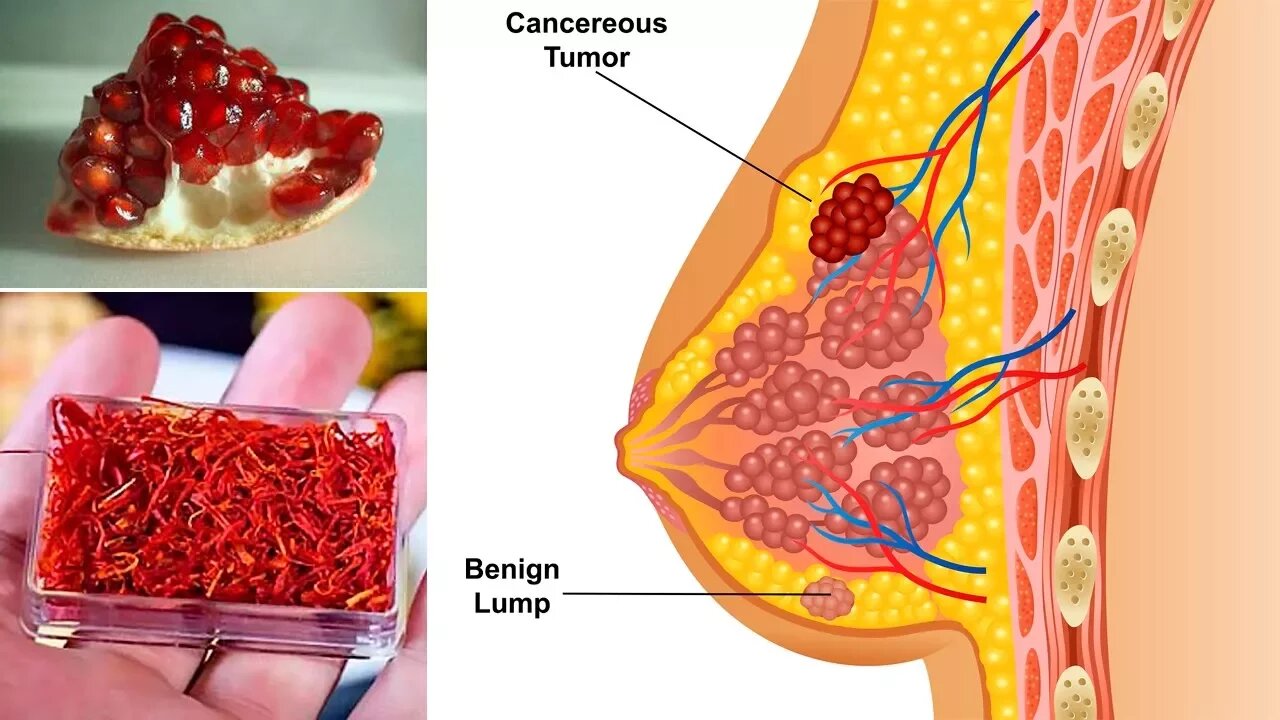Premium Only Content

Top 12 Super Foods That Fight Breast Cancer
Breast cancer is a disease caused by our bodies cellular unbalance. It’s most commonly found in women.
Early diagnosis is the best way to effectively treat breast cancer, so getting an annual mammogram is one of the best ways for women over 40 to prevent this disease.
Aside from early diagnosis, keeping your cells balanced and free of harmful free radicals is the second best way to avoid this disease.
So, here is a list of foods that contain chemical compounds that help slow the development of cancer.
Green Tea
Green tea is rich in polyphenols and catechins. These substances are antioxidants that protect our cells from DNA damage caused by free radicals. One cup of green tea per day is the recommended amount.
Pomegranate juice
Pomegranate juice also contains polyphenols. According to recent studies, pomegranate juice has the potential to be a preventative tool for certain types of cancer, including breast cancer.
Blueberries, strawberries and black raspberries
These fruits contain large quantities of polyphenols, that may contain anticancer properties. Furthermore, they are rich in antioxidants, such as vitamin C. You should eat from ¾ of a cup to 1 cup of fruit a day.
Plums and peaches
Studies indicate that the polyphenols found in plums and peaches can help prevent breast cancer cell formation and keep them from multiplying.
Evidence suggest that polyphenols help kill cancerous cells, without harming healthy cells.
Cruciferous vegetables
These vegetables are normally rich in antioxidants (such as vitamins C, E and K) and fiber. The most popular cruciferous vegetables are:
- Broccoli;
- Cauliflower;
- Brussel sprouts;
- Arugula;
- Cabbage.
Green vegetables
The greener the vegetable, the denser the nutrients. Green vegetables are normally rich in antioxidants and fibers, which makes them valuable tools against cancer.
Carotenoids
Carotenoids are found in red, orange, dark green and yellow fruits and vegetables. These foods are very rich in vitamin A, lutein, beta carotene and lycopene, all of which are effective against free radicals.
Apigenin
Apigenin is a flavonoid found in certain fruits, vegetables and herbs. As apigenin is an antioxidant, these foods may have anti-inflammatory properties as well.
The most common sources of apignenin are:
- Parsley;
- Celery;
- Chamomile;
- Mint;
- Spinach;
- Licorice.
Omega-3 Fatty Acids
Found abundantly in cold water fish, omega-3 fatty acids are an essential nutrient for the functioning of your immune system.
The most common sources of Omega-3 are:
- Salmon;
- Sardines;
- Herring;
- Fish oils, such as cod liver oil.
Whole grains
Whole foods also tend to be high in anticancer polyphenols, they usually include other essential nutrients such as fiber, magnesium and protein.
Some examples of whole grains are:
- Brown rice;
- Oats;
- Corn;
- Barley.
Peppers
Both dehydrated and fresh peppers contain capsaicin. This component is a very powerful antioxidant in the fight against free radicals and it also has anticancer power. The hotter the pepper, the higher the concentration of capsaicin.
Garlic
Garlic is especially effective for people suffering from breast cancer that have a reaction with estrogen.
Saffron
Saffron has curcumin that helps decrease the toxic effects of certain breast cancer cells and can inhibit the growth of cancer cells.
Always remember that breast cancer treatment should be overseen by a doctor, however, these tips may help to complement it, so talk to your doctor about these foods.
------------------------------
Facebook: https://bit.ly/38BWbw3
Pinterest: https://bit.ly/2Irvwa6
Disclaimer: The materials and the information contained on Natural Cures channel are provided for general and educational purposes only and do not constitute any legal, medical or other professional advice on any subject matter. These statements have not been evaluated by the FDA and are not intended to diagnose, treat or cure any disease. Always seek the advice of your physician or other qualified health provider prior to starting any new diet or treatment and with any questions you may have regarding a medical condition. If you have or suspect that you have a medical problem, promptly contact your health care provider.
-
 3:55
3:55
Natural Cures
1 year ago $0.84 earnedDrink This Tea Tonight to Flush Out All The Toxins from the Body
3.26K4 -
 LIVE
LIVE
FreshandFit
3 hours agoAfter Hours w/ Girls
9,496 watching -
 1:45:26
1:45:26
Kim Iversen
8 hours agoBANNED for Telling the Truth: The 9/11 and Epstein Plot They Don't Want You To Hear
52.9K86 -
 1:08:47
1:08:47
Man in America
10 hours agoDr. Makis EXPOSES Big Pharma’s SICK Vaccine Scam—RFK Jr. Must Act NOW!
57.3K13 -
 1:28:21
1:28:21
Glenn Greenwald
8 hours agoRFK Jr. Hearing Reveals DC Pro-Pharma Consensus; Trump's Executive Order to Deport Student Protesters Criticizing Israel; Untangling DC Think Tank Funding & Influence | SYSTEM UPDATE #399
111K137 -
 1:23:44
1:23:44
Space Ice
9 hours agoSpace Ice & Redeye: Van Damme's The Quest: Pirates, Clowns, James Bond & Bloodsport
34.7K2 -
 59:57
59:57
The StoneZONE with Roger Stone
6 hours agoJ6 Martyr Enrique Tarrio Describes Inhumane Prison Conditions Ordered by Biden | The StoneZONE
30.4K3 -
 16:48
16:48
Tundra Tactical
6 hours ago $1.15 earnedAffordable Medical Gear From ACETAC SHOT Show 2025
28.2K2 -
 1:46:16
1:46:16
Redacted News
9 hours agoRFK CONFIRMATION: Kennedy goes to WAR with Big Pharma Democrats in Fiery Hearing | Redacted Live
220K402 -
 57:31
57:31
Candace Show Podcast
9 hours agoBREAKING! Taylor Swift Turns Against Blake Lively & Ryan Reynolds | Candace Ep 141
205K200